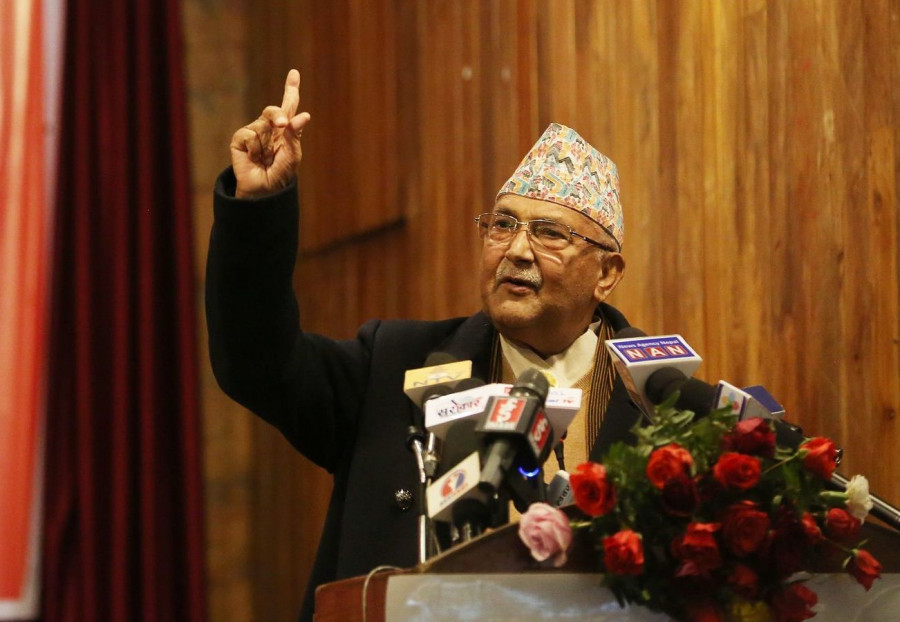National
Contempt of court case against Oli filed at Supreme Court
Two advocates have filed separate petitions, saying the prime minister disparaged the court and legal practitioners.
Post Report
Two cases of contempt of court have been registered at the Supreme Court against Prime Minister KP Sharma Oli.
“Two cases of contempt of court against the prime minister were registered on Tuesday,” said Devendra Dhakal, information officer at the Supreme Court.
[Read: Why KP Sharma Oli is behaving as though he is the state]
Senior advocate Kumar Sharma Acharya and advocate Kanchan Krishna Neupane have filed the contempt of court cases against Oli for using disparaging remarks against legal practitioners and trying to influence the court.
“After two days, the Supreme Court officials registered my petition today,” said Acharya, who had reached the court first on Sunday with the contempt of court petition against Oli.
On January 22, Oli, while addressing his cadres, was defending his House dissolution move. And in doing so, he said that lawyers were arguing ad nauseum despite the fact that the constitution has no provision allowing restoration of the House.
Oli had taken a jibe at senior advocate and former chair of Nepal Bar Association, Krishna Prasad Bhandari, saying that the petitioners were giving trouble to a “grandfather” lawyer as well.
[Read: In mocking lawyers and judiciary, Oli is making a mockery of rule of law]
Bhandari, 94, on January 17 had argued on behalf of the petitioners who have challenged Oli’s House dissolution move.
The Constitutional Bench of the Supreme Court is currently hearing as many as 13 writ petitions against Oli’s December 20 House dissolution move.
Former chairs of Nepal Bar Association on January 24 had issued a statement, taking exception to Oli’s “shameful attack” on legal practitioners.
In his petition, Acharya has said through his remarks, the prime minister has made the court and legal practitioners an object of ridicule and therefore he committed a contempt of court as per Article 128 (4) of the constitution.
Article 128 (4) states: “All must abide by any interpretation of the constitution or a law made by or any legal principle laid by the Supreme Court in the course of trying a lawsuit. If anyone makes obstruction in the dispensation of justice by, or disregard any order or judgment handed down by, it or any of its subordinate courts, the Supreme Court may, in accordance with law, initiate proceedings and impose punishment for contempt.”
[Read: A scrambling Oli government produces gazette before court, but it’s backdated]
Acharya has argued that Article 20 of the constitution protects the legal profession in the country.
In the petition, Acharya has said disgracing an individual is against the dignity of the prime minister’s position.
“Since the words and behaviour of Khadga Prasad Oli, who is currently the sitting prime minister, has disgraced the court and the bench, action on a contempt of court case should be taken against him,” the petition states.
Similarly, yet another contempt of court case has been filed against Daman Nath Dhungana, a former Speaker. The contempt case was filed against him for making a public statement that Supreme Court justices could be targeted if they fail to take people’s sentiment into consideration while delivering justice.
A contempt of court case against Dungana was filed as he had said in a public forum the justices of the Supreme Court could be targeted if they did not consider the people’s sentiment while delivering justice.
Another contempt of court case against four former chief justices, however, is under consideration, according to court officials.
“Since the addresses of former chief justices were not clear, that petition could not be registered,” said Dhakal.
[Read: Oli resorting to vituperation turns the conversation ugly and nasty]
On January 8, four former chief justices–Min Bahadur Rayamajhi, Anup Raj Sharma, Kalyan Shrestha and Sushila Karki –had issued a statement, calling KP Sharma Oli’s House dissolution move unconstitutional. Opinions are divided over their statement, with some saying as private citizens they have the right to do so while others argue that their statement undermined the independence of the judiciary and that they tried to influence the bench.
Clause 7 (a) of the Supreme Court Act, 1991 on Contempt of Supreme Court and Subordinate Courts states that Supreme Court may impose punishment up to one year imprisonment or fine up to ten thousand rupees or both to the person convicted, in case wherein the Supreme Court has initiated the proceeding of its own contempt or contempt of subordinate courts or judicial authorities
While Clause 7(2) says notwithstanding anything contained in Sub-Section (1), if the accused or convict apologises to the satisfaction of the court, the Supreme Court may pardon or excuse, remit the punishment imposed or may suspend the punishment with conditions determined by the Court and if the conditions as are fulfilled the court may order not to execute the penalty.




 13.12°C Kathmandu
13.12°C Kathmandu













